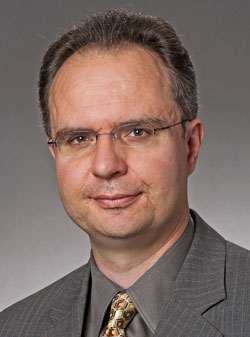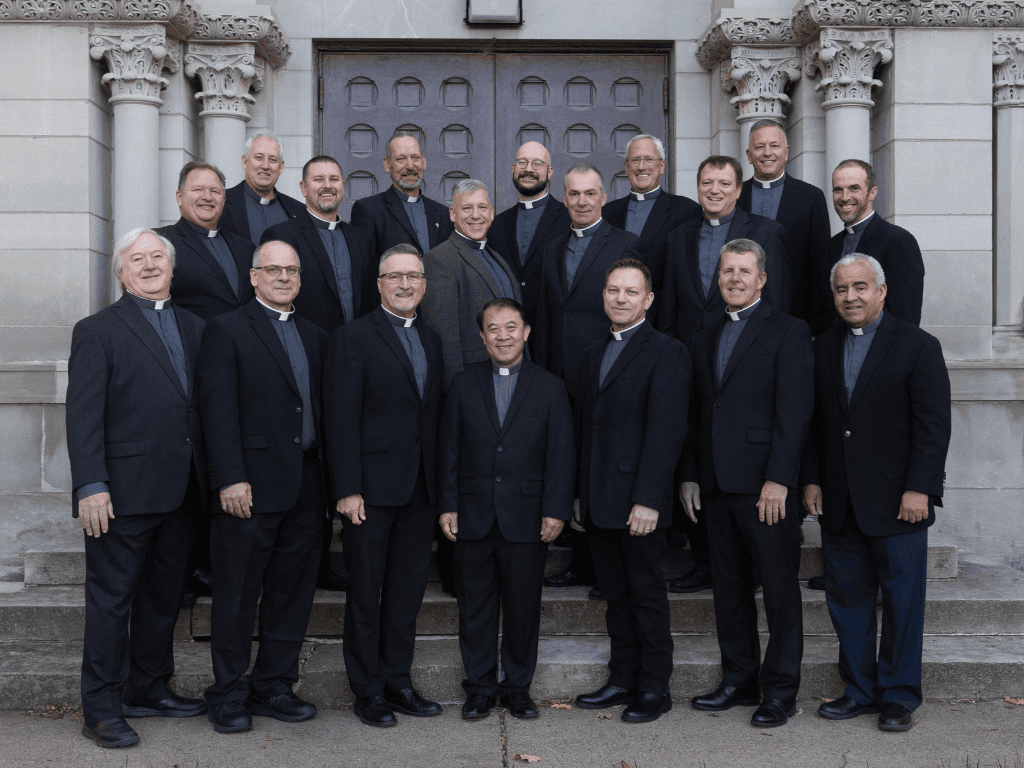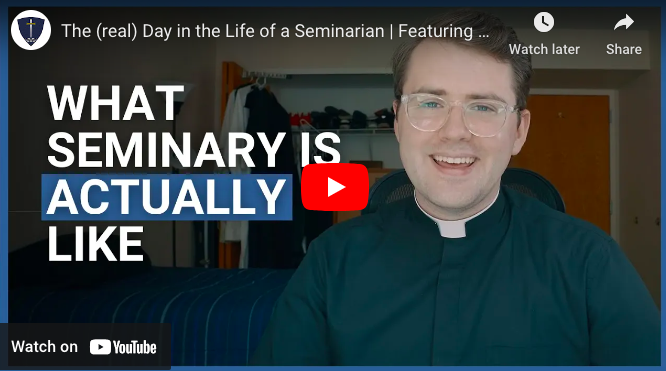Dr. Paul Gavrilyuk, a member of the University of St. Thomas Theology Department since 2001, has been appointed the Aquinas Chair in Theology and Philosophy in the College of Arts and Sciences, it was announced by Dr. Terence Langan, dean of the college.
Gavrilyuk is the fourth professor to hold the endowed chair, which was established 25 years ago by the late Monsignor Terrence Murphy when he was president of the university. It most recently had been held by Dr. Thomas Sullivan, a retired member of the university’s Philosophy Department, who held the chair for more than 20 years.
“I have some big shoes to fill,” Gavrilyuk said of his predecessor. “Dr. Sullivan has left a rich and enduring legacy. He is a first-rate philosopher and a master teacher. Among his accomplishments, one could mention his support for junior faculty and his collaboration with the university’s Theology Department.”
That kind of collaboration, Gavrilyuk feels, is key to his new role as the Aquinas Chair.
“I am deeply grateful to my colleagues for their vote of confidence,” he said, adding that “this position is not about the chair holder, but about building bridges and supporting creative work within the department. Theology occupies a unique, identity-defining place in St. Thomas’ liberal arts curriculum.
“Theology is a bridge-building discipline inasmuch as it grounds, unites and completes other knowledge domains. As Aquinas Chair, my goal is to promote cooperation between the Theology Department and other constituents of the university.”
He plans to run an interdisciplinary colloquium in which theologians and nontheologians could come together to discuss their work. He recently established a new public lecture series entitled "The New Frontiers in Theological Research." In this series that began last fall, St. Thomas professors share their research with students and the public. They are being recorded and can be seen via YouTube. Examples include these lectures by theology professors Dr. Michael Hollerich and Dr. Anne King.
“My colleagues have responded very positively to this initiative,” Gavrilyuk said. The project already has a list of speakers for the next five years; this semester Dr. John Martens will discuss how Christianity changed the lives of children, and next semester Dr. Terence Nichols will speak on the progress of the Muslim Christian Dialogue Center he co-directs.
Gavrilyuk also looks forward to supporting initiatives such as the international conference on the Second Vatican Council that the Theology Department organized last year. And for the past two summers he participated in a joint Cambridge-Notre Dame-Southern Methodist University Analytic Theology Workshop, funded by the Templeton Foundation. The workshop equips theologians with the tools of contemporary analytic philosophy and introduces analytic philosophers to the craft of theology and its various subdisciplines.
“I would like to see similar initiatives take place at St. Thomas,” he said. “To borrow a Socratic simile, being named the Aquinas Chair is to become a midwife, helping to give birth to the Theology Department’s projects, especially those that connect theology with other disciplines.”
Dr. Bernard Brady, chair of St. Thomas’ Theology Department, said the review process for selecting the next Aquinas Chair “took many months and included outstanding candidates from the United States and Europe.”
Langan, dean of the College of Arts and Sciences, added that “it became clear during this search that our Theology Department has a number of internationally known scholars, including Dr. Gavrilyuk.”
While he now resides in St. Paul, Gavrilyuk was born in Kiev, Ukraine, and studied physics at the Moscow Institute of Physics and Technology, the Russian equivalent of MIT in the United States.
“I studied in Moscow during the Perestroika and witnessed the collapse of the Soviet Union in 1991,” he said. “I majored in solid-state physics, but there were also tremendous opportunities for auditing public lectures in humanities. The course‘Christianity: History and Culture, which was similar to the Christian Theological Tradition course at St. Thomas, had a deep, formative impact on me. The Russian professor who taught the course, Father George Chistyakov, won me over and became a friend. I learned my theology while walking him from the lecture room to the train station. You might say I had an ‘Emmaus Road’ experience at college. I am ‘stuck in college’ because of it, I think.
“After college I searched for various possibilities to continue my theological studies in a new, post-Soviet Russia, but very little was available then. I decided to cross the ocean, and my parents were quite supportive.”
Gavrilyuk is likely the first student from the former Soviet Union to study theology in the United States. “There were certainly hardships, including an ordeal with the U.S. visa, but those all sound trivial when I compare them to the trials and tribulations of other immigrants. If you can make it in Moscow during a military coup, the collapse of the social order and hyperinflation, you can make anywhere.”
He said the move from Moscow to Dallas, where in 2001 he received his Ph.D. in religious studies at Southern Methodist University, was a major culture shock but also provided “an enormous creative boost. I learned theology just as I previously learned physics: watching the best minds of the 20th century in action and doing a lot of independent reading. I am a teacher today because I have had world-class teachers on both sides of the Atlantic.”
Today Gavrilyuk is a scholar in the fields of early Christian theology and modern philosophical theology. His work has focused on the development of the Christian doctrine of God, the Christianization of the Roman Empire, and contemporary ecumenical issues, especially the union between the Christian East and West.
He is widely published with works translated into eight languages. He is author of two books and a co-editor of another two. His most recent book is a study that seeks to enrich contemporary theological anthropology by retrieving the pre-modern concept of spiritual perception.
Gavrilyuk also is the author of many scholarly articles and is published in the Journal of Theological Studies, Scottish Journal of Theology, Modern Theology, Harvard Theological Review, Vigiliae Christianae and Studia Liturgica. He also is a leading authority on 20th century Orthodox theology. He will publish the book Georges Florovsky and the Russian Religious Renaissance with Oxford University Press next year.
Gavrilyuk has held visiting appointments at Harvard Divinity School and Ukrainian Catholic University. This past year he had speaking engagements in Australia, United Kingdom, Ukraine, Italy, Romania and Serbia, and this past summer he led a national faculty seminar on Christian scholarship at Calvin College.
He serves on the Board of Directors of the Pappas Patristic Institute in Boston and on the Board of Editors of Fortress University Press’ new series Shapers of Modern Theology. He is adviser to several university presses, including those of Oxford, Cambridge and Fordham. A recipient of nine University of St. Thomas grants, Gavrilyuk was University Scholar in 2008-2010.
When he began applying for teaching positions, he said St. Thomas was at the top of his list. “I had heard about the quality of our Theology Department from others, including people at Notre Dame and the University of Dallas, and when I came I was even more impressed. I think the fact that my department was able to collaborate on a major textbook, The Christian Theological Tradition, which is used not only at St. Thomas but also at several non-Catholic universities, is a testimony to our collegiality and the quality of our scholarship.”
Gavrilyuk notes that since 2005 at St. Thomas, every third Professor of the Year and every fourth University Scholar came from the Theology Department. Professor of the Year recognizes outstanding teaching, while the University Scholar Grant supports field-defining research. “I think that this is a strong endorsement of the quality of our teaching and scholarship by students and colleagues alike,” he said. “As holder of the Aquinas Chair, I want to capitalize on these strengths in order to help build our department in the future.”
Gavrilyuk serves as a deacon at Holy Trinity Church in St. Paul, a parish of the Orthodox Church in America. He has done missionary work in Kazakhstan and Costa Rica.
“Teaching at Catholic universities is becoming increasingly common for the Orthodox and other non-Catholic scholars,” he said. “We owe this ecumenical openness to the spirit of Vatican II. For example, the theology departments of Fordham, Duquesne and Marquette all have two full-time Orthodox theologians on faculty. In our department at St. Thomas, two other Orthodox scholars, Father Thaddeus Wojcik and my wife, Eugenia, teach on a part-time basis. Orthodox scholars and students are also an integral part of the broader St. Thomas community and I believe that this experience is mutually enriching.
“Pope John Paul II and his successors have frequently expressed a desire that the church must begin ‘to breathe with two lungs,’ meaning those of the Catholic West and the Orthodox East. In my scholarship, I am testing what such a ‘breathing technique’ might look like in practice.
“For example, recently I finished a book on 20th century Russian emigre theology, where one central question is the formation of the Eastern Orthodox identity in the West. Since interactions with my colleagues cause me to cross the ‘East-West boundary’ several times a day, this historical work becomes especially meaningful. As an Eastern Orthodox interlocutor, I have always felt welcome at St. Thomas, but more importantly, I have always felt intellectually engaged.”







